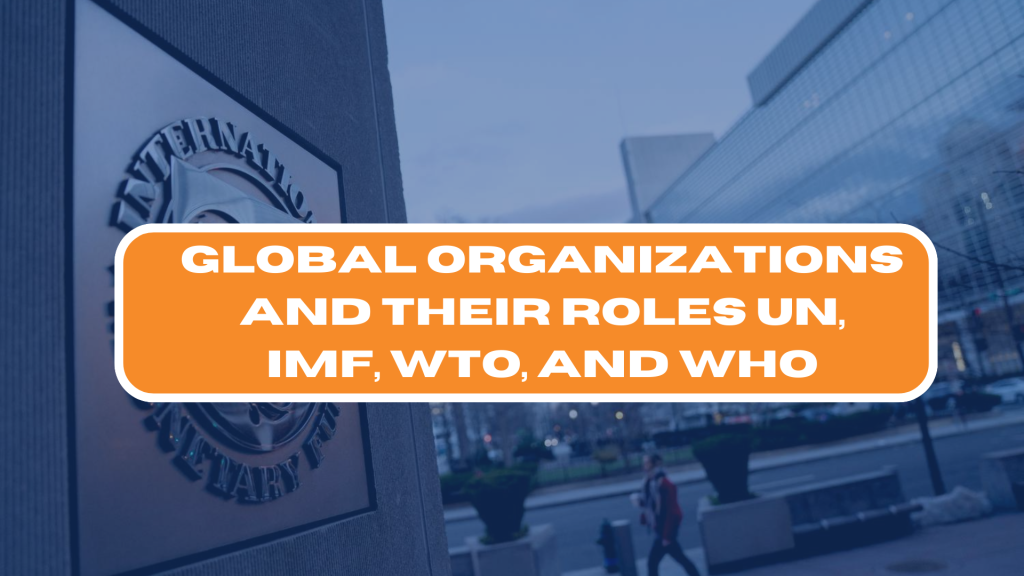International organizations play a rather important role in maintaining peace and economic stability, facilitating trade, and safeguarding the public health of its people. The idea of global cooperation has made the world closer than ever before, and hence international cooperation is the need of the hour. This global collaboration is needed if citizens plan on tackling the ever rising issue of economic or political conflicts, climate change and the international tug of war that brings about and other minor instabilities. Without international governance, nations would not be able to address these problems individually.
Among the most influential global institutions that support global stability and development in the world are the United Nations (UN), International Monetary Fund (IMF), World Trade Organization (WTO), and World Health Organization (WHO). All these institutions around the clock are striving to guarantee peace, to advance financial stability, to stabilize international trade, and to guarantee protection to the public’s health. Together they make sure economic inequalities are brought under control, human rights are ensured, and health crises are dealt with efficiency.
The UN plays a fundamental role in maintaining global peace and security through diplomatic efforts and humanitarian missions. The IMF provides financial assistance and policy guidance to countries facing economic difficulties. On the other hand, the World Trade Organization brings about better international trade and ensures fair economic growth. Meanwhile, the WHO tackles the ever-troubling issue of health and works quite diligently to combat diseases and improve healthcare systems worldwide, an issue which has become rampant since COVID-19.

United Nations (UN): Encouraging Peace and Cooperation
The United Nations (UN) was formed in 1945 following World War II to avoid future wars and foster international cooperation. The UN has 193 member states and is a platform where countries can sit down and address global problems.
Major Functions of the UN:
- Keeping International Peace and Security – The UN sends peacekeeping forces to areas of conflict to ensure stability and stop violence.
- Human Rights Protection – The UN, through the Universal Declaration of Human Rights, seeks to protect basic freedoms.
- Humanitarian Aid – Agencies such as the UNICEF, UNHCR, and WFP offer assistance to refugees, children, and affected areas.
- Sustainable Development – The UN Sustainable Development Goals (SDGs) seek to eradicate poverty, enhance education, and fight climate change.
- Environmental Protection – The UNEP (United Nations Environment Programme) addresses international environmental concerns.
The UN has an important role to play in bringing nations together and addressing common challenges.
International Monetary Fund (IMF): Promoting Economic Stability
The International Monetary Fund (IMF) was established in 1944 to provide international economic stability. With its 190 member countries, the IMF offers financial support, policy guidance, and economic surveillance to deserving countries.
Major Functions of the IMF:
- Financial Assistance – The IMF provides loans to nations experiencing economic crises to support their recoveries.
- Tracking Global Economy – The IMF monitors global economic trends and gives reports to enable governments to take informed decisions.
- Guidance on Economic Policy – The IMF guides nations on monetary policies, taxation, and fiscal policies to ensure stability.
- Capacity Development – It provides training and technical support to build economies.
Through its role as a financial safety net, the IMF assists nations in coping with economic fluctuations and avoiding extreme financial crises.
World Trade Organization (WTO): Promoting Global Trade
The World Trade Organization (WTO) was established in 1995 to manage and promote international trade. With 164 member countries, it promotes that trade goes on smoothly, equitably, and without undue restrictions.
Main Functions of the WTO:
- Negotiations in Trade – The WTO offers a forum for nations to negotiate and agree on trade policies.
- Conflict Resolution – If disagreements over trade between nations arise, the WTO resolves them using legal means.
- Decreasing Trade Restrictions – The WTO encourages low tariffs and reduced limitations to support free trade.
- Observing Trade Policies – It monitors international trade practices to facilitate equity and transparency.
- Assisting Developing Economies – The WTO assists developing economies to join international trade through special terms and aid.
By ensuring fair trade, protecting the environment, and promoting labor standards, the WTO is instrumental in propelling world economic growth.
World Health Organization (WHO): Protecting Global Health
The World Health Organization (WHO) was founded in 1948 and is accountable for international public health. With 194 members, it engages in the control of diseases, enhancing healthcare, and the response to health crises.
Major Functions of the WHO:
- Control and Eradication of Diseases – The WHO has been at the forefront in controlling diseases such as polio, malaria, and COVID-19.
- Global Health Guidelines – It establishes health standards and makes recommendations on medical practice and public health policy.
- Emergency Response – The WHO organizes international responses to pandemics, outbreaks, and health emergencies.
- Vaccine Development and Distribution – Initiatives such as COVAX facilitate fair vaccine distribution across the globe.
- Health Awareness and Education – The WHO raises awareness regarding matters such as mental health, nutrition, and hygiene.
Through close collaboration with governments and organizations, the WHO promotes improved health for people across the globe.
Summing Up
The UN, IMF, WTO, and WHO all play specific but interdependent roles in making the world more stable, prosperous, and healthy. The UN is responsible for working towards peace and cooperation, the IMF maintains financial stability, the WTO provides fair trade, and the WHO protects public health. These entities are crucial to the solution of global issues and building a more sustainable future for everyone.
ixamBee specializes in providing expert guidance and resources for banking exams 2024, ensuring that you are well-prepared for the Upcoming Bank Exams like RBI Grade B, NABARD Grade B, IBPS SO, and more. Our courses align with the bank exam calendar 2024, covering all the essential topics. With a focus on the upcoming bank jobs, our Previous Year Papers, BeePedia, SSC CGL, SSC CHSL, SSC MTS and other Mock Tests are designed to help you excel in upcoming banking exams.
Also Read:
Major International Treaties and Their Impact on World Politics
Economic Crises and Recovery Strategies of Leading Nations
International Trade Agreements: RCEP, USMCA, and Indo-Pacific Deals














